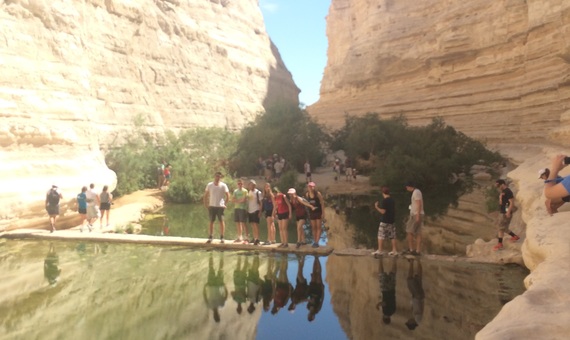This week's Sabbath is also the start of the Hebrew month of Elul, which means that our majestic High Holidays begin to appear on the horizon.
Elul may be the final month of the year - but, in Jewish spiritual life, Elul is far more a beginning than an end. The month is a warming up, rather than a winding down. Traditionally, Elul is a time of preparation, a stretch of spiritual exercise, when, in some communities, special gatherings are held at or before daybreak to sing prayers that shake the spirit awake.
Throughout this past year of commenting on our weekly Torah readings, the writings of Rabbi Kalonymus Kalmish Shapira of Piaseczno - in his final years, the Rebbe of the Warsaw Ghetto - have kept me company. When at a loss, when my mind has drawn a blank, I have often turned to one or the other of the Piaseczner Rebbe's books and collections of sermons, and usually I have found something that has set my own thoughts in motion.
And another source of inspiration, week by week, is reflecting on our community here at Harvard.
In a conversation with students in 1921, Rabbi Shapira remarked:
"It is well known and one must remember that it is impossible to be constantly in a spiritually elevated state - perforce, there will be highs and lows. In fact, one who has never experienced falling from a spiritual height has likely never ascended to an especially lofty point."
Living in spiritual community means helping one another up - and it means recognizing that, whatever our individual accomplishments, each of us can be thankful for a helping hand quite often, so that each of us can go on to extend one. In that sense, for all the ups and downs of spiritual life, spiritual community is a vehicle of ascent.
This week, in the Torah, on the verge of entering into the Land, our ancestors are told that there will be a particular place, "which the Eternal One your God will choose, from among all your tribes, to place the Divine name there - and there, where God indwells, you shall seek, and there you shall go; and there you shall bring your burnt offerings and your sacrifices and your tithes, the offerings of your hands, and your vowed donations, and the firstlings of your herds and flocks." (Deuteronomy 12:5-6) The reference is to the eventual Temple in Jerusalem, the focal point of our ancient ancestors' devotion.
The way in which this week's Sabbath falls upon the calendar this year results in this reading from the Torah being juxtaposed, in our synagogues, with the prophetic reading for the beginning of a new month - from the book of Isaiah - in which we hear a notable skepticism about focus on a mere structure and its practices:
"Thus says the Eternal One, the heavens are My throne, and the earth My footstool - what is this House that you would build for Me, and what place is my abode?" (Isaiah 66:1)
Even sacrifices, of the sort offered in the ancient Temple, may be regarded with a dim view by the Divine as represented by the prophet in this message:
"One that slaughters an ox is like one who strikes a man, one that sacrifices a lamb is like one who breaks a dog's neck, one who raises up a meal offering is like one who offers pig's blood, one who burns incense like one who blesses an idol. Those ones, too, have chosen their ways, and their souls delight in their abominations." (Isaiah 66:3)
It is a stunning rebuke - all the more so for being directed at familiar, ancestral rituals, prescribed in the Torah itself.
It is not that the prophet is against the central shrine and capital. "Gladden Jerusalem," he says, "and delight in her, all you who love her - celebrate celebration with her, all you who have mourned over her!" (Isaiah 66:10)
What the prophet detests, in the Divine name, is empty ritual, religious practice whose real purpose is self-satisfaction and aggrandizement. If that is the nature of the service offered in the sanctuary, it is so disgusting that the prophet - and, he says, God - can hardly bear to look at it.
"But upon this one I shall look - upon the poor and contrite of heart, who trembles at My word." (Isaiah 66:2)
Coming together in a place of dedication, approaching a sacred time together, is an ascent - an 'aliyah, in the Hebrew terms of our tradition - a pilgrimage.
What one should discover upon entering into a place of ascent, and upon embarking on a spiritual journey, is not pretentious ritual experts who have convinced themselves that the rites and ceremonies in which they are well practiced make them the superior darlings of the Divine, entitled to condescend in showing new arrivals how to be. God forbid.
What one should discover is humble fellow seekers, good spiritual company on the pilgrim path - sources of inspiration who are inspirational not least because they also look to you for uplift, and are eager to learn about what impels your own spirit on the climb toward a holy destination.
"And then it shall be that at every new moon and every Sabbath all flesh shall come to worship before Me, says the Eternal One." (Isaiah 66:23)

